What is the Rafah crossing and why is it Gaza’s lifeline?
Gaza #Gaza

Palestinians have been gathering at the Rafah border crossing with Egypt in the southern Gaza Strip in the hope of leaving ahead of an expected Israeli ground offensive.
US media had reported it would open for dual nationals to leave and for humanitarian aid to enter, without giving timings.
However the crossing point remained closed on Monday morning.
What is the Rafah crossing?
It’s the southernmost post of exit from Gaza and borders Egypt’s Sinai desert.
There are only two other border crossings from and into the Gaza strip – Erez, a border crossing with Israel in north Gaza, and Kerem Shalom, a solely commercial junction between Israel and Gaza. Both are shut.
Why is it important now?
Hamas forces assaulted the Erez crossing in northern Gaza on 7 October, damaging it severely. Days later, Israel declared Erez closed until further notice, leaving the Rafah border as the only point of entry and exit for civilians into and from Gaza.
Rafah is now also the crossing point for humanitarian aid must also pass from there. Last week, the Egyptian foreign ministry said it was directing international aid flights for Gaza to the al-Arish airport in northern Sinai, and dozens of lorries carrying fuel and humanitarian goods are parked near the Rafah crossing, waiting to be let through.
What is going on at the crossing?
Since the start of the Hamas attacks against Israel on 7 October, conflicting reports have circulated about the situation at the Rafah border crossing. Hamas and Egypt exercise control over who can pass through, but Israel is able to disrupt the crossing by bombing the area around it.
Egyptian media said the crossing was shut down following three Israeli strikes on Rafah on 9 and 10 October, which it said left injuries on the Egyptian and Palestinian sides of the border.
On 12 October, the Egyptian government asked Israel to stop air strikes near the Rafah border crossing so it could serve as a “support lifeline” for people in Gaza, and made it clear it wouldn’t open the passage until there were guarantees for the safety of its staff.
Western countries are also getting involved to try to ensure that Rafah is a safe passage for both foreign passport holders in Gaza and humanitarian aid.
The UK’s foreign secretary James Cleverly and his US counterpart Antony Blinken both said they were working with Israel, Egypt and “other leading political voices in the region” to open the crossing.
Last week, a US State Department spokesperson said that its citizens were being told to move towards Rafah because “there may be very little notice if the crossing opens and it may only open for a limited time”.
Rumours that the crossing might open have led Gaza residents to travel to the border in the hope of being let through.
On Monday, crowds gathered following reports suggesting Rafah could be temporarily reopened following an agreement of a ceasefire, but both Israel and Hamas swiftly denied this.
Why is the border staying shut?
Israel wants to prevent Hamas militants from being able to leave Gaza, and wants to inspect all lorries travelling into Gaza to ensure they aren’t carrying weapons.
Meanwhile, although Egypt appears to be cooperating with other countries in negotiating the reopening of the border for foreign passport holders and humanitarian aid, the Egyptian government is concerned about a potential exodus of Palestinians to Sinai and is unlikely to want to open the border to any and all Gaza residents wanting to flee.
It is also concerned about the possibility of Islamist militants coming into the country.
How is the Rafah crossing normally used?
Rafah does not allow Palestinians exit from Gaza easily. Palestinians wishing to use the border crossing must register with the local Palestinian authorities two to four weeks in advance and may be rejected by either the Palestinian or Egyptian authorities with little warning or explanation.
According to the UN, in August 2023, the Egyptian authorities allowed 19,608 exits of people from Gaza and denied entry to 314 people.
More on Israel-Gaza war